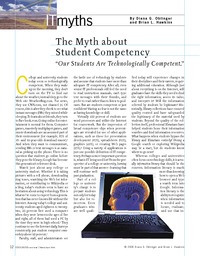Do we have an operative definition of IT literacy?
It can be easy to oversimplify IT
literacy as the ability to use a computer
and a search engine. Does the quality
of different information resources
matter? Has the institution discussed
the new media and communication
forms that have become part of our
culture—multimedia, podcasts, Web
sites, IM, and avatars? Is the institution
defining IT literacy based on today’s
tools (word-processing programs,
spreadsheets) or on the activities they
enable (communication, analysis)? As
the world increasingly uses visualization,
audio, and augmented reality, is
the institution including these in the
definition of IT literacy, or did it stop
with keyboarding skills?
von Diana G. Oblinger, Brian L. Hawkins im Journal Digital Game-Based Learning (2006) im Text The Myth about Student Competency auf Seite 13What skills do students (and faculty) need
in a digital world? A college/university
education is designed to develop
subject matter expertise, among other
competencies. As more and more material
is made available in digital form,
IT skills become necessary to access
and manipulate those information
resources. But a college/university
education also implies that students
acquire other critical skills, such as information
gathering, analysis, critical
thinking, and problem-solving. Each
of those can be facilitated by technology.
Is the institution providing
students with the tools, guidance, and
practice they need? Can the students
tell a legitimate source from one that
is biased? Not to be forgotten are the
ethics associated with ideas, information
resources, and communication.
In an age of cut-copy-and-paste, music
downloads, and pirated software, do
the students have guidance in applying
the principles of academic honesty
and respect to the digital world?
von Diana G. Oblinger, Brian L. Hawkins im Journal Digital Game-Based Learning (2006) im Text The Myth about Student Competency 
 Diese Seite wurde seit 8 Jahren inhaltlich nicht mehr aktualisiert.
Unter Umständen ist sie nicht mehr aktuell.
Diese Seite wurde seit 8 Jahren inhaltlich nicht mehr aktualisiert.
Unter Umständen ist sie nicht mehr aktuell.













 Zitate aus diesem wissenschaftlichen Zeitschriftenartikel
Zitate aus diesem wissenschaftlichen Zeitschriftenartikel
 , 75 kByte;
, 75 kByte;  2021-03-20)
2021-03-20) 


 Biblionetz-History
Biblionetz-History  QR-Code dieser Seite
QR-Code dieser Seite